关于地衣的最新文献- 267
IF 1.5
4区 生物学
Q4 PLANT SCIENCES
引用次数: 0
摘要
Abas,A.&L.Din.2021。马来西亚雪兰莪州热带山地森林中地衣沿海拔梯度的多样性。马来西亚赛恩斯50(5):1199–1209。Adeel,S.、A.Majeed、Fazal-ur-Rehman、M.Azeem、N.Iqbal和N.Amin。2020.地衣衍生产品是天然染料的可持续来源。第245–261页。在:M.Yusuf(编辑),地衣衍生产品:提取和应用。斯克里夫纳出版社,马萨诸塞州贝弗利。Agnelli,A.、G.Corti、L.Massaccesi、S.Ventura和L.P.D'Acqui。2021.生物结皮对极地生态系统土壤形成的影响。大地测量学401:115340。Alam,M.A.,R.Khatoon,S.Huda,N.Ahmad和P.K.Sharma。2020.地衣的生物技术应用。第203–219页。在:M.Yusuf(编辑),地衣衍生产品:提取和应用。斯克里夫纳出版社,马萨诸塞州贝弗利。Ament Velásquez,S.L.,V.Tuovinen,L.Bergström,T.Spribille,D.Vanderpol,J.Nascimbene,Y.Yamamoto,G.Thor&H.Johannesson。2021.地块增厚:莱塔里亚的单倍体和三倍体样铊、杂交和偏交交配型比率。真菌生物学前沿2:656386。Aptrout,A.,L.A.Santos,I.O.Junior,J.G.Cavalcante和M.E.S.Cáceres。2021.来自巴西的地衣:亚马逊地区阿克里的地衣真菌清单。真菌分类单元136(2):541。Aptrout,A.,M.F.Souza和A.A.Spielmann。2021年。巴西南马托格罗索州马拉卡茹的两个新的硬壳枝孢属物种和其他新的地衣。Cryptogamie,真菌学42(8):137–148。[新增(均来自巴西):C.gumboskii Aptrout、M.F.Souza&Spielmann、C.zebrathallina Aptrout&Spielman、Lecanora fluoroxylina Aptrot&M.F.Sousa、Lecanora lichexanyoxylina Aptrot和M.F.Souza。2021.分子、形态和化学数据证明了墨西哥旱生灌丛植被中黄颡菌属(Parmeliaceae)物种的多样性。马德里博塔尼科花园分析78(1):e107。巴克曼,J.J.1958。隐配子附生植物的植物社会学和生态学,包括分类调查和欧洲植被单位的描述。Van Gorcum,Assen。xiii,628页。Benitez,G.N.,G.D.Aguilar和D.Blanchon。2021.新西兰北部城市森林中Metrosideros excelsa地衣的空间分布。多样性13(4):170。Bennett,K.L.,S.L.Skiles Jones&S.Strawn。2021.用于薄层色谱(TLC)的商业级材料的功效。Evansia 38(2):73–83。Berger,F.&W.von Brackel。2021.Lichenoendersonia physciicola sp.nov.,Physcia上的一种新体腔菌。疱疹34(1):138–141。[新:L.physciicola F.Berger&Brackel(关于奥地利的P.tenella,德国的P.adscendens)。]Bergin,R.,I.Koch,A.Rutter,J.Shirley&B.Zeeb。2021.评估加拿大北极环境中可食用植物和真菌物种的汞浓度。《环境质量杂志》50(4):877–888。Biju,H.,A.Sabeena和S.Nayaka。2021年,印度喀拉拉邦西高止山脉的Graphidaceae(地衣化真菌)的新记录。真菌研究6(1):213–223。Bishop,L.,J.T.Maxwell和P.E.Rothrock。2021年。成熟的印第安纳州次生林中的古老生长特征:平衡管理的机会。托雷植物学会杂志148(2):132-153。[包括古老生长背景下的地衣多样性。]Boluda,C.G.、V.J.Rico、Y.Naciri、D.L.Hawksworth和C.Scheidegger。2021.系统发育地理重建可能因祖先共享的等位基因而有偏差:欧洲和北非的多态性苔藓苔藓的例子。分子生态学30(19):4845–4865。Brodo,I.M.,R.E.Lee,C.Freebury,P.Y.Wong,C.J.Lewis和R.T.McMullin。2021年。安大略省和魁北克省渥太华地区地衣、相关真菌和地衣真菌的增加,反映了生物群的变化。加拿大野外博物学家135(1):1-27。Broome,A.,L.L.Inchboard,M.Perks,T.-K.Clarke,K.J.Park&R.Thompson。2021.在种植的古老林地中,残留的大西洋橡树的附生地衣能在林地恢复的早期阶段存活下来吗?《森林科学年鉴》78:58。加州自然多样性数据库。2021.CNDDB特殊维管植物、苔藓植物和地衣名录的变化。加利福尼亚州鱼类和野生动物部,萨克拉门托。[未分页,35页]页。[包括一些地衣。]加州自然多样性数据库(CNDB)。2021.特殊维管植物、苔藓植物和地衣名录。加利福尼亚州鱼类和野生动物部,萨克拉门托。i–xvi,1–159页。[包括一些地衣。]Cannon,P.,B.Coppins,D.Ertz,A.Fletcher,A.Pentecost&J.Simkin。2021.Arthoniales:Opeographaceae,包括属1作者电子邮件:jlendemer@nybg.org本系列的累积数据库以可搜索的形式在万维网上提供,网址为http://nhm2.uio.no/botalsk/lav/RLL/RLL。 HTM提供完整的摘要、DOI,并在可能的情况下链接到电子版文章。感谢以下人士:Einar Timdal在RLL数据库上的工作,Bill Buck检查最近发表的文献,Jim Bennett分享Scopus警报,以及许多发送其作品重印或电子版本以供收录的作者。DOI:10.1639/0007-2745-125.4.649本文章由计算机程序翻译,如有差异,请以英文原文为准。
Recent literature on lichens—267
Abas, A. & L. Din. 2021. The diversity of lichens along elevational gradients in the tropical montane Forest of Selangor, Malaysia. Sains Malaysiana 50(5): 1199–1209. Adeel, S., A. Majeed, Fazal-ur-Rehman, M. Azeem, N. Iqbal & N. Amin. 2020. Lichen-derived products as sustainable source of natural dyes. Pages 245–261. In: M. Yusuf (ed.), Lichen-Derived Products: Extraction and Applications. Scrivener Publishing, Beverly, Massachusetts. Agnelli, A., G. Corti, L. Massaccesi, S. Ventura & L. P. D’Acqui. 2021. Impact of biological crusts on soil formation in polar ecosystems. Geoderma 401: 115340. Alam, M. A., R. Khatoon, S. Huda, N. Ahmad & P. K. Sharma. 2020. Biotechnological applications of lichens. Pages 203–219. In: M. Yusuf (ed.), Lichen-Derived Products: Extraction and Applications. Scrivener Publishing, Beverly, Massachusetts. Ament-Velásquez, S. L., V. Tuovinen, L. Bergström, T. Spribille, D. Vanderpool, J. Nascimbene, Y. Yamamoto, G. Thor & H. Johannesson. 2021. The Plot Thickens: Haploid and triploid-like thalli, hybridization, and biased mating type ratios in Letharia. Frontiers in Fungal Biology 2: 656386. Aptroot, A., L. A. Santos, I. O. Junior, J. G. Cavalcante & M. E. S. Cáceres. 2021. Lichens from Brazil: A checklist of lichenized fungi from Acre, in the Amazon. Mycotaxon 136(2): 541. Aptroot, A., M. F. Souza & A. A. Spielmann. 2021. Two new crustose Cladonia species with strepsilin and other new lichens from the Serra de Maracaju, Mato Grosso do Sul, Brazil. Cryptogamie, Mycologie 42(8): 137–148. [New (all from Brazil): C. gumboskii Aptroot, M.F.Souza & Spielmann, C. zebrathallina Aptroot & Spielmann, Lecanora fluoroxylina Aptroot & M.F.Souza, Lecanora lichexanthoxylina Aptroot & M.F.Souza, Trypethelium muriforme Aptroot & M.F.Souza.] Barcenas-Peña, A., S. D. Leavitt, F. Grewe & H. T. Lumbsch. 2021. Diversity of Xanthoparmelia (Parmeliaceae) species in Mexican xerophytic scrub vegetation, evidenced by molecular, morphological and chemistry data. Anales del Jardı́n Botánico de Madrid 78(1): e107. Barkman, J. J. 1958. Phytosociology and ecology of cryptogamic epiphytes including a taxonomic survey and a description of their vegetation units in Europe. Van Gorcum, Assen. xiii, 628 pages. Benitez, G. N., G. D. Aguilar & D. Blanchon. 2021. Spatial distribution of lichens in Metrosideros excelsa in northern New Zealand urban forests. Diversity 13(4): 170. Bennett, K. L., S. L. Skiles-Jones & S. Strawn. 2021. Efficacy of commercial-grade materials for thin-layer chromatography (TLC). Evansia 38(2): 73–83. Berger, F. & W. von Brackel. 2021. Lichenohendersonia physciicola sp. nov., a new coelomycete on Physcia. Herzogia 34(1): 138– 141. [New: L. physciicola F.Berger & Brackel (on P. tenella from Austria, P. adscendens from Germany).] Bergin, R., I. Koch, A. Rutter, J. Shirley & B. Zeeb. 2021. Evaluating mercury concentrations in edible plant and fungi species in the Canadian Arctic environment. Journal of Environmental Quality 50(4): 877–888. Biju, H., A. Sabeena & S. Nayaka. 2021. New records of Graphidaceae (lichenized fungi) from the Western Ghats of Kerala state, India. Studies in Fungi 6(1): 213–223. Bishop, L., J. T. Maxwell & P. E. Rothrock. 2021. Old-growth attributes in a maturing secondary Indiana state forest: An opportunity for balanced management. Journal of the Torrey Botanical Society 148(2): 132–153. [Includes lichen diversity in context of old-growth.] Boluda, C. G., V. J. Rico, Y. Naciri, D. L. Hawksworth & C. Scheidegger. 2021. Phylogeographic reconstructions can be biased by ancestral shared alleles: The case of the polymorphic lichen Bryoria fuscescens in Europe and North Africa. Molecular Ecology 30(19): 4845–4865. Brodo, I. M., R. E. Lee, C. Freebury, P. Y. Wong, C. J. Lewis & R. T. McMullin. 2021. Additions to the lichens, allied fungi, and lichenicolous fungi of the Ottawa region in Ontario and Quebec, with reflections on a changing biota. The Canadian Field-Naturalist 135(1): 1–27. Broome, A., L. L. Inchboard, M. Perks, T.-K. Clarke, K. J. Park & R. Thompson. 2021. Can epiphytic lichens of remnant Atlantic oakwood trees in a planted ancient woodland site survive early stages of woodland restoration? Annals of Forest Science 78: 58. California Natural Diversity Database (CNDDB). 2021. Changes to the CNDDB Special Vascular Plants, Bryophytes, and Lichens List. California Department of Fish and Wildlife, Sacramento. [unpaginated, 35 pp.] pages. [Includes some lichens.] California Natural Diversity Database (CNDDB). 2021. Special Vascular Plants, Bryophytes, and Lichens List. California Department of Fish and Wildlife, Sacramento. i–xvi, 1–159 pages. [Includes some lichens.] Cannon, P., B. Coppins, D. Ertz, A. Fletcher, A. Pentecost & J. Simkin. 2021. Arthoniales: Opegraphaceae, including the genera 1 Author’s email: jlendemer@nybg.org The cumulative database for this series is available in searchable form on the World Wide Web at http://nhm2.uio. no/botanisk/lav/RLL/RLL.HTM with full abstracts, DOIs, and links to electronically available articles when possible. Thanks to the following: Einar Timdal for his work on the RLL database, Bill Buck for checking recently published literature, Jim Bennett for sharing Scopus alerts, and the many authors who send reprints or electronic versions of their works for inclusion. DOI: 10.1639/0007-2745-125.4.649
求助全文
通过发布文献求助,成功后即可免费获取论文全文。
去求助
来源期刊

Bryologist
生物-植物科学
CiteScore
2.40
自引率
11.10%
发文量
40
审稿时长
>12 weeks
期刊介绍:
The Bryologist is an international journal devoted to all aspects of bryology and lichenology, and we welcome reviews, research papers and short communications from all members of American Bryological and Lichenological Society (ABLS). We also publish lists of current literature, book reviews and news items about members and event. All back issues of the journal are maintained electronically. The first issue of The Bryologist was published in 1898, with the formation of the Society.
Author instructions are available from the journal website and the manuscript submission site, each of which is listed at the ABLS.org website.
All submissions to the journal are subject to at least two peer reviews, and both the reviews and the identities of reviewers are treated confidentially. Reviewers are asked to acknowledge possible conflicts of interest and to provide strictly objective assessments of the suitability and scholarly merit of the submissions under review.
 求助内容:
求助内容: 应助结果提醒方式:
应助结果提醒方式:


